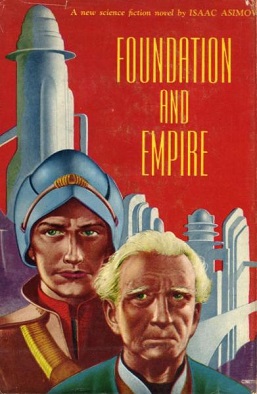Adams, Anderson, Asimov.
Crichton, Christie, Clarke.
Dillard, Douglas, Duncan.
Hemingway, Herbert, Hiassen.
Irving, Irving, Isherwood, James, James.
Michener, Milne, Mitchell.
Pratchett, Pullman, Puzo.
Sagan, Scalzi, Shakespeare.
Stephenson, Thurber, Trollope.
Twain, Tolkien, Vinge.
Wallace, Warren, Westerfeld, Wouk, Willis.
Category Archives: literature
Gender-swap the Foundation!
Isaac Asimov’s Foundation novels were among the first grown-up science fiction I read. I still remember picking up the tattered dime-store paperback copy of Foundation in the high school library, opening it up, and getting sucked into the story of a galaxy-spanning Empire that was about to collapse from its own cultural-historical inertia, and a rogue colony of “psycho-historians” who use a sort of historical physics to guide the galaxy through the coming dark age to a Second Empire even better and more stable than the first one.
Word on the Web is that HBO is planning a television adaptation of the Foundation series, and I am totally excited. But it’s going to be very interesting to see how this adaptation proceeds. For one thing, the first stories in the series date back to the early 1940s, so their ideas about “futuristic” technology need some serious updating. The first novel, Foundation, implies that it’s possible to have faster-than-light travel and interstellar war without understanding nuclear fission.
For another thing, the first stories in the series date back to the early 1940s, so very nearly every character who does anything meaningful in them is a man. (There is one story, in the later books, that revolves around a precocious teenage girl, and another that centers on a husband-and-wife couple.) But this, it has occurred to me, is not a problem! The Foundation novels are fundamentally not about interpersonal interactions—their recurring theme is that people are swept along in broad historical currents. The story, and its drama, is literally about the Fall and Rise of Empires, not about individual people. So it actually doesn’t matter what gender anyone in the Foundation stories is. As a bonus, everyone’s names are in Asimov’s concept of future-ese, which makes many of them less obviously gendered: Hari Seldon, Salvor Hardin, Bel Riose. Those are all dudes in the original, but don’t tell me they couldn’t each be women.
So my challenge to the folks working on this adaptation: Gender-swap every other character that you adapt from the original Foundation books. You’ll end up with a more human vision of the future, and you might just end up creating the next Starbuck — or several of them — in the process.
Life, um, finds a way

Bedbug, up close. (Flickr: Armed Forces Pest Management Board)
The LA Review of Books has just posted my review of Unnatural Selection: How We Are Changing Life, Gene By Gene—a highly accessible book about how insect pests, weeds, disease organisms, wildlife, and even cancer cells evolve in response to the chemicals and drugs we use to contain them. I particularly focus on the skin-crawling case of bedbugs:
Bedbugs are a particularly intimate example, at least from the human perspective, of the broader trend. Surveys of exterminators report that between 2001 and 2007, the number of bedbug infestations across North America increased 20-fold, concentrated in places like apartment complexes, college dormitories, and homeless shelters in major urban areas. Some of this resurgence is due to international travel. Major ports like New York, San Francisco, and Miami are epicenters of bedbug activity, and genetic surveys show that the bugs are arriving from multiple populations, not spreading from a single geographic source. Still, a large part of the bedbug revival is attributable to the fact that the bugs have developed a resistance to many of the insecticides that kept them down for decades.
Go read the whole thing, and try not to scratch.
(naked fisticuffs are always optimal)
Via Got Medieval: Myths RETOLD does exactly what it says on the tin, with ATTITUDE. For instance, Beowulf. Here’s our hero awaiting the murderous monster Grendel’s highly predictable arrival after the party in Hrothgar’s meadhall:
then the party kind of starts to wind down
so beowulf just goes ahead and strips naked
in the hopes of making this task as needlessly difficult as possible
which actually he fails to do
because it turns out no weapon on earth can harm grendel anyway
so naked fisticuffs are optimal
(naked fisticuffs are always optimal)anyway Grendel shows up
makes a big show of ripping the doors off
which actually begs the question
do they replace the doors every day?
or does Grendel replace the doors every day
just so he will have something to rip off at night?
either way he immediately eats one of Beowulf’s men
while Beowulf stands there like HMM I SEE
INTERESTING
Even if you haven’t read the original, you will laugh painfully hard. Expect seriously salty language, but nothing that Beowulf himself wouldn’t use if he had a MySpace page.

